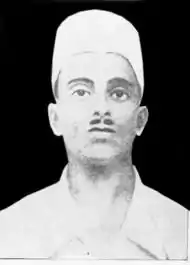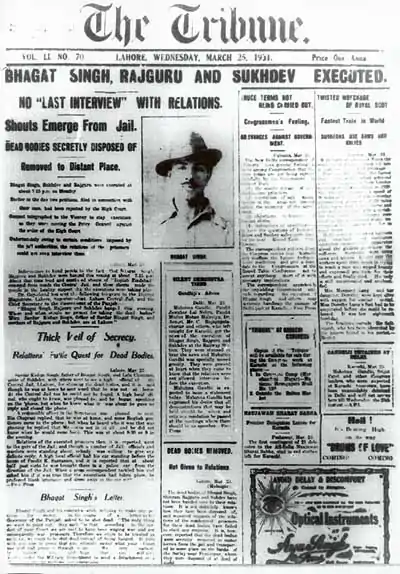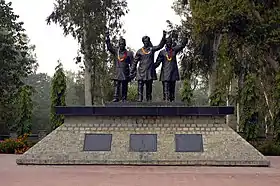Sukhdev Thapar
Sukhdev Thapar (15 May 1907 – 23 March 1931) was an Indian revolutionary. A senior member of the Hindustan Socialist Republican Association, he participated in several actions alongside Bhagat Singh and Shivaram Rajguru, and was hanged by the British authorities on 23 March 1931 at the age of 23.
Sukhdev Thapar | |
|---|---|
 | |
| Born | 15 May 1907 |
| Died | 23 March 1931 (aged 23) |
| Cause of death | Execution by Hanging |
| Nationality | Indian |
| Organization | HSRA, Naujawan Bharat Sabha |
| Movement | Indian Independence movement |
Early life
Sukhdev Thapar was born in Ludhiana, Punjab, British India on 15 May 1907 to Ramlal Thapar and Ralli Devi.[1] A Hindu Khatri, he was brought up by his uncle Lala Achintram after the death of his father.[2]
Revolutionary activities
HSRA
Sukhdev was a member of the Hindustan Socialist Republican Association (HSRA), and organised revolutionary cells in Punjab and other areas of North India.[3] He was the chief of Punjab unit of HSRA and instrumental in taking decisions.
Sukhdev participated in numerous revolutionary activities such as a prison hunger strike in 1929; he is best known for his assaults in the Lahore Conspiracy Case (1929-30).[4] He is best remembered for his involvement in the assassination of Deputy Superintendent of Police, J. P. Saunders, on 17 December 1928, by Bhagat Singh and Shivaram Rajguru,[3] undertaken in response to the violent death of the veteran leader Lala Lajpat Rai.[3]
Lahore Conspiracy Case
Sukhdev was the prime accused in the Lahore Conspiracy Case of 1929, whose official title was "Crown versus Sukhdev and others." The first information report (FIR) of the case, filed by Hamilton Harding, senior superintendent of police, in the court of R.S. Pandit, the special magistrate in April 1929, mentions Sukhdev as accused number 1. It describes him as Swami alias villager, son of Ram Lal, caste Thapar Khatri.[1] After the Central Assembly Hall bombings in New Delhi (8 April 1929), Sukhdev and his accomplices were arrested, convicted, and sentenced to death.

On 23 March 1931, Thapar was hanged in Lahore jail, along with Bhagat Singh and Shivaram Rajguru.[3][4] Their bodies were secretly cremated at the banks of the River Sutlej.
Reactions to the executions
The executions were widely reported in the press, especially as they took place on the eve of the annual convention of the Indian National Congress in Karachi.[5] The New York Times reported:
A reign of terror in the city of Cawnpore in the United Provinces and an attack on Mahatma Gandhi by a youth outside Karachi were among the answers of the Indian extremists today to the hanging of Bhagat Singh and two fellow-assassins.[6]
B. R. Ambedkar, writing in an editorial in his newspaper Janata, blamed the British government for its decision to go ahead with the executions, despite strong popular support for the revolutionaries.[7] He felt that the decision to execute the trio was not taken in the true spirit of justice, but was driven by the Labour Party-led British government's fear of backlash from the Conservative Party and a need to appease public opinion in England. The Gandhi-Irwin pact, signed just weeks before the execution, was viewed by the Conservatives as having dented the prestige of the British Empire. In such a situation, if the British government or the Viceroy of India commuted the death sentence awarded to the trio convicted of assassinating a British policeman, it would have given the Conservatives more ammunition to criticize an already weak British government in the parliament.
Legacy

National Martyrs Memorial is located at Hussainiwala, where Sukhdev, along with Bhagat Singh and Rajguru, were cremated. A Martyrs' Day (Shaheed Diwas) is observed on March 23 in their memory. Tributes and homage is paid at the memorial.[8]
Shaheed Sukhdev College of Business Studies, a constituent college of the University of Delhi, is named in memory of Sukhdev. It was established in August 1987.[9]
Amar Shaheed Sukhdev Thapar Inter-State Bus Terminal is the main bus stand of Ludhiana city, the birthplace of Sukhdev.[10]
References
- "Mark of a martyr - Sukhdev Thapar". The Tribune India. 13 May 2007. Archived from the original on 23 March 2012. Retrieved 26 May 2018.
- Pramod Maruti Mande (2005). Sacred offerings into the flames of freedom. Vande Mataram Foundation. p. 251. ISBN 978-81-902774-0-2.
- "Facts about martyr Sukhdev Thapar". India Today. 15 May 2017. Retrieved 25 May 2018.
- "Remembering the men who shook up the British Raj". The Economic Times. 23 March 2017. Retrieved 25 May 2018.
- "Bhagat "Indian executions stun the Congress". The New York Times. 25 March 1931. Retrieved 2011-10-11.
- "Bhagat "50 die in India riot; Gandhi assaulted as party gathers". The New York Times. 26 March 1931. Retrieved 2011-10-11.
- आंबेडकर, B. R. Ambedkar बी आर (22 March 2018). "'Three Victims' – Ambedkar's editorial on Bhagat Singh's martyrdom". Forward Press. Retrieved 26 March 2019.
- "Nation paid tributes to Bhagat Singh, Rajguru & Sukhdev on their 86th martyrdom day". Retrieved 25 May 2018.
- "Shaheed Sukhdev". Shaheed Sukhdev College of Business Studies. Retrieved 25 May 2018.
- "Punjab Roadways takes city bus stand's charge temporarily". Hindustan Times. 24 January 2016. Retrieved 25 May 2018.
Further reading
- Hundal, Sandeep Singh (2013). Sukhdev: An Immortal Martyr of India. Delhi: Indraprastha Prakashan. OCLC 904267904.
- Noorani, Abdul Gafoor Abdul Majeed (2001) [1996]. The Trial of Bhagat Singh: Politics of Justice. Oxford University Press. ISBN 0195796675.
| Wikimedia Commons has media related to Sukhdev Thapar. |